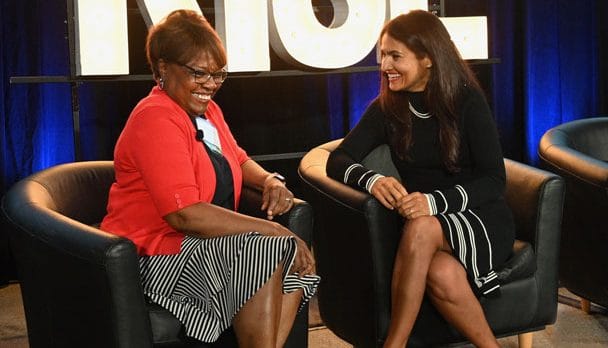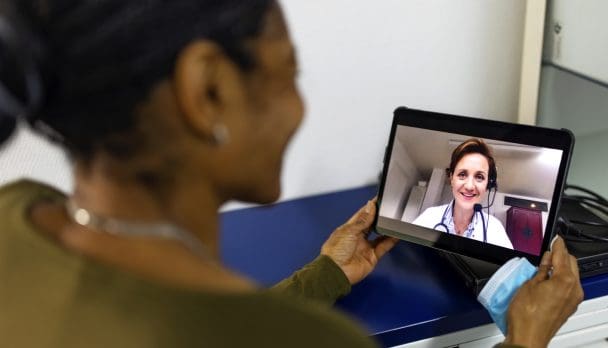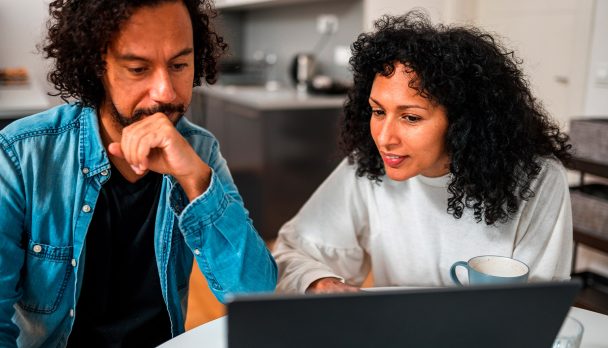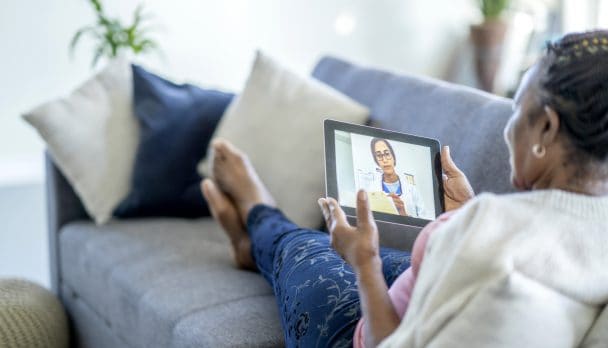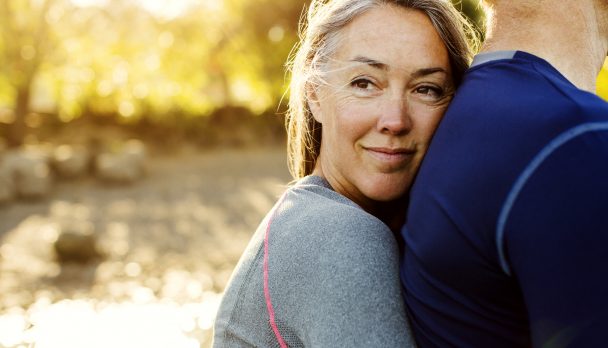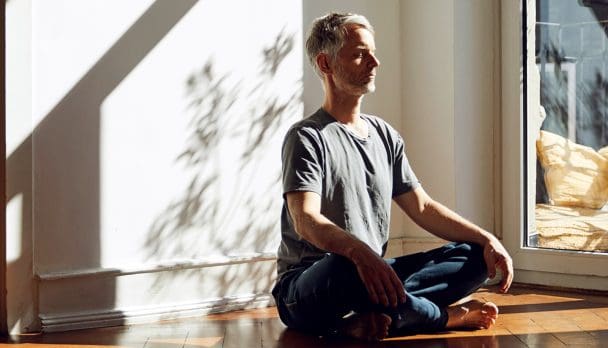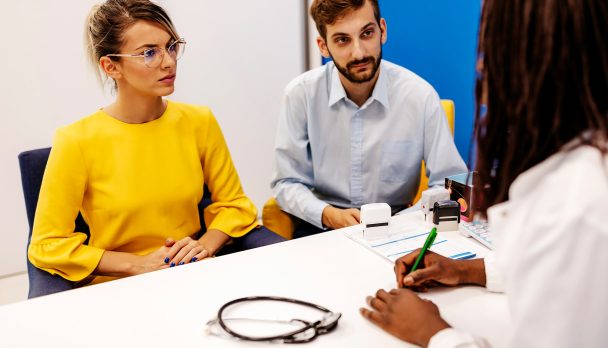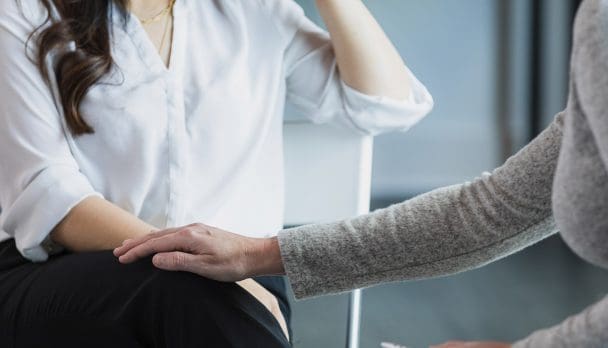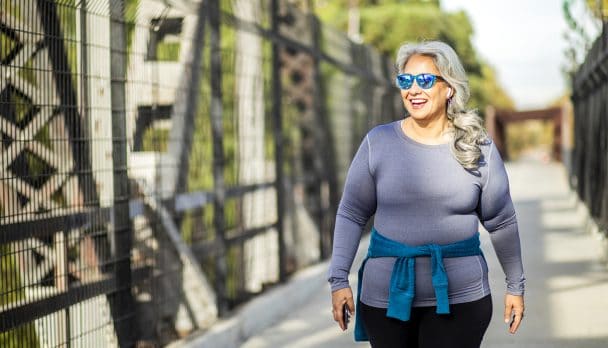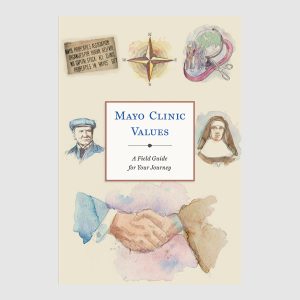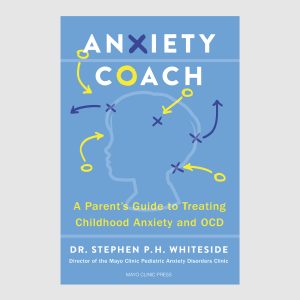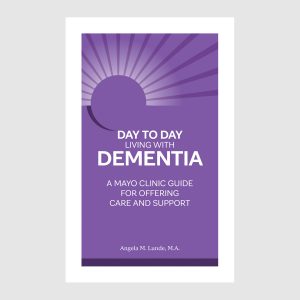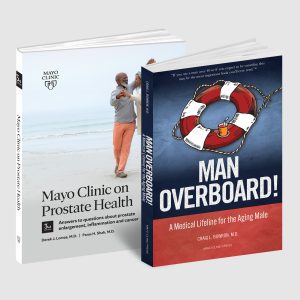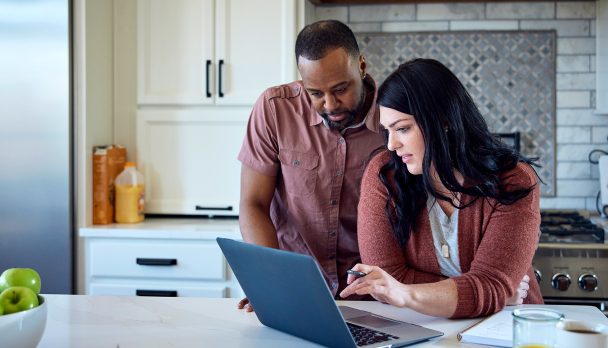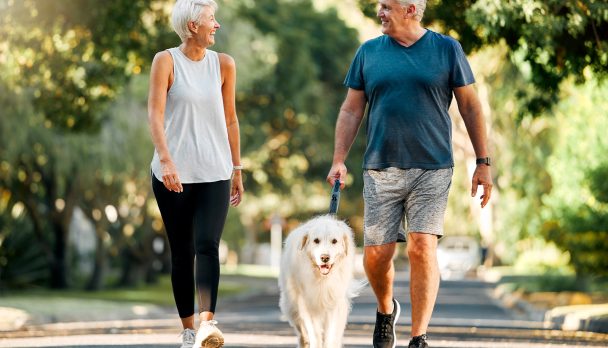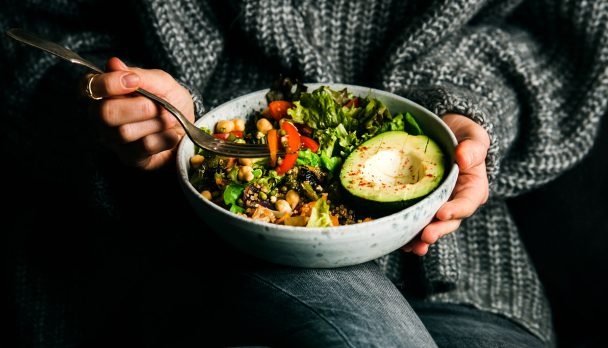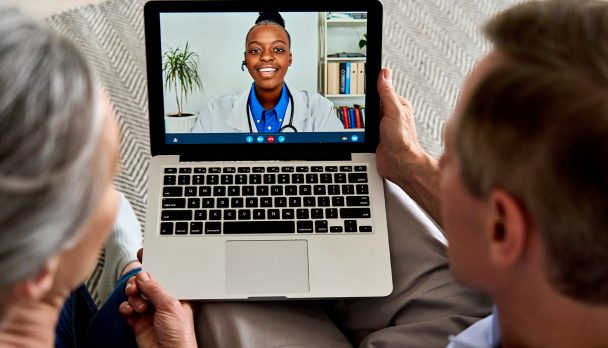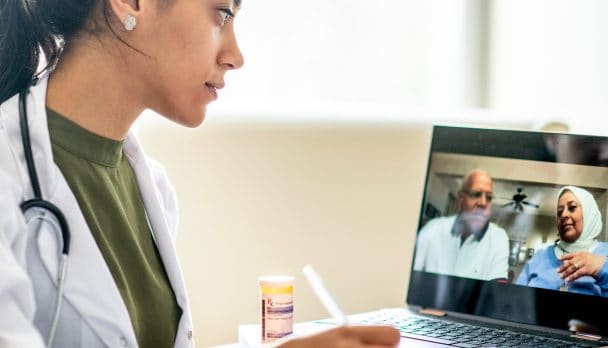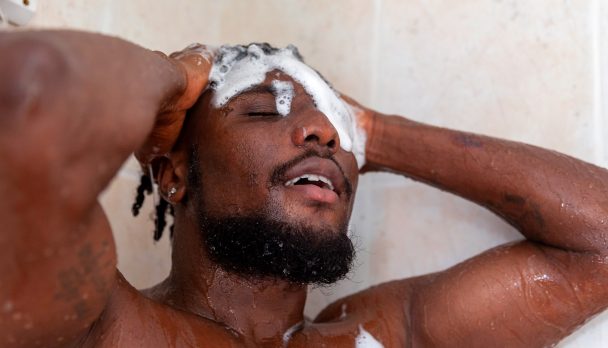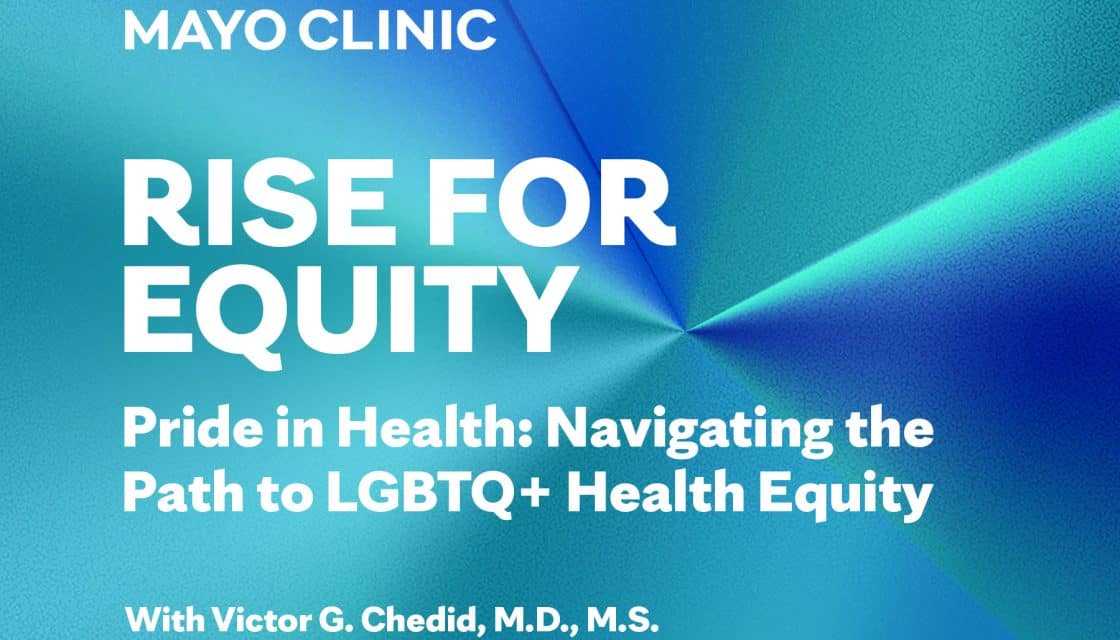
On this episode of the RISE for Equity podcast, Dr. Victor Chedid joins host Nicole Nfonoyim-Hara to explore the critical topic of Health Equity within the LGBTQ+ communities. Delving into the multifaceted dimensions of this issue, the discussion sheds light on the significant impact of healthcare and access for LGBTQ+ individuals, from confronting prevalent challenges to presenting actionable resources for patients and healthcare providers alike. Join us for an engaging dialogue poised to resonate with both professionals and patients alike, as we navigate the landscape of healthcare equity.
“The point of the IBD Pride Clinic is to declare to the world that we have that safe space for you, and that we’re ready and welcoming and wanting you to come seek your care with us in a safe affirming space and we strive to keep your needs at the center of all our endeavors, just like the Mayo Clinic always says—the clinic’s value is the patient’s needs come first.”
– Dr. Victor Chedid
Guest: Victor Chedid, M.D. is a physician specializing in gastroenterology and hepatology, with subspecialty certification in Gastroenterology and Hepatology and Internal Medicine. Dr. Chedid has a subspecialty interest in Inflammatory Bowel Diseases.
“Creating affirming spaces for physicians is very important. Creating affirming spaces for medical students is very important. As a medical student, when you see somebody who’s more senior than you, who belongs to the community, who’s advocating, who is out and proud and is doing research in these fields or in LGBT health equity, you’d probably think “I can be that person.”
– Dr. Victor Chedid
Read the Transcript:
Nicole Nfonoyim-Hara: Welcome to the Rise for Equity podcast. In this series, we’ll be talking to leading physicians, scientists, and innovators about what it’s going to take to transform healthcare for a more just, more equitable future. I’m Nicole Nfonoyim-Hara, your host on the podcast, and today I’m joined by Dr. Victor Chedid. We’re discussing the health disparities faced by the LGBTQI community and Dr. Chedid’s work as an advocate for LGBTQIA patients, trainees, and staff in his specialty and beyond. Welcome to the podcast, Dr. Chedid.
Dr. Victor Chedid: Thank you so much, Nicole, for having me. I’m really excited to be here.
Nicole Nfonoyim-Hara: So, the LGBTQI community, as you know, is really diverse. It’s really intersectional, and it encompasses identities that are related to sexuality, but also gender identity and expression, and then, as I said, intersectional. So, you’ve got faith and race, class, ability, all these things. Before we dive in, could you help us just build some shared language by defining the acronym LGBTQIA+?
Dr. Victor Chedid: Absolutely, and I love how you acknowledged, first and foremost, the intersectionality and the diversity of that community, while it is labeled as LGBTQ+ as one bucket, but it is very diverse, and everybody’s experiences are so different, and it is used as a term that can describe people’s sexual orientation and gender identity.
Many times, we use it interchangeably with the term sexual and gender minorities, and it is an acronym for different identities, lesbian, gay, bisexual, transgender, queer, or questioning. The plus is a recognition of the diversity and that it’s not limited to just these identities.
Nicole Nfonoyim-Hara: Often on this podcast, we talk about how health disparities and inequity have historical roots. In terms of the LGBTQI community in the United States, what has some of that history looked like in terms of health equity?
Dr. Victor Chedid: So first and foremost, I always remind everybody that health is a fundamental human right. Health equity is only achieved when we all have the ability to attain the full potential for our health and our well-being.
We recognize that there are so many factors that impact people from achieving that equity, whether it is historical injustices or contemporary injustices, economic or social obstacles that people face, and other elements of health disparities that are preventable.
It all has to do with history of a lot of stigma, discrimination, not being accepted by whether their personal community, whether in their family, or on a bigger scale in their society, to prevent the LGBT community from achieving the health equity that they deserve.
Nicole Nfonoyim-Hara: It seems like a lot of layers in terms of the equity issues that are facing the community and I love how you sort of mapped us through the individual and communal, and then all the institutional and systemic things as well. You talked a little bit about the impacts. How does not being able to even see someone impact health outcomes and well-being in mental health?
Dr. Victor Chedid: Let’s say somebody needs to seek care for a medical condition they’re facing, they have some symptoms. I go to a GI—because I’m a gastroenterologist. You’re having symptoms of bloody diarrhea or abdominal pain, and you belong to the LGBT community. You might sit at home and suffer and not seek that care because you’re afraid of the discrimination you’re going to face at the doctor’s office. Or if you come out to talk about your symptoms, you worry that the providers will blame my identity for getting these symptoms, or for getting such a diagnosis.
Many people might delay the care they need, and they end up pushing it out until they have more severe conditions and ending up requiring more severe or drastic measures to treat their condition or ending up in the emergency room rather than seeking outpatient care.
Nicole Nfonoyim-Hara: The story that you sort of outlined in terms of someone really suffering on their own and having to delay care and the long-term impacts of that supersede just the physical symptoms. What are some barriers and biases that patients are experiencing when they’re in the doctor’s office speaking with a provider that’s still preventing them from getting the care that they need?
Dr. Victor Chedid: There’s a lot of implicit biases that people carry that impact how they treat individuals who belong to the LGBT community. Let’s say you’re at the doctor’s office and the people don’t know how to talk to somebody from the transgender community or somebody who is nonbinary. So, they end up misgendering them. Misgendering means where they’re referring to them in not their gender identity, using the wrong pronoun, when they’re addressing that person, or deadnaming them. Deadnaming means when somebody is being referred to by their birth name rather than by their actual name.
These things have major impacts on an individual because they feel that they’re erased. They’re not being honored by who they truly are. Imagine that that’s happening every time you go to a physician’s office or a healthcare system. You’re probably going to be frustrated. You’re probably going to be disappointed. You probably are going to feel that: “Hey, they don’t care about me as a human being and maybe I should seek my care in another healthcare system where they might honor me. But I also might not even seek care altogether because everywhere I go, I might experience stigma or misgendering.”
Another thing is that, in the healthcare setting, many of us can lack cultural competency in terms of understanding differences with cultures, from other LGBTQ plus-related health issues, or pertinent, cultural nuances that are from the LGBT community. Also going back to your initial point of intersectionality, cultural differences with ethnicities and race, or gender cultural competence.
With that said, when we lack cultural competence and we’re not training the healthcare providers and the staff at the healthcare offices on cultural sensitivity and cultural competence, that can further the stigma and further the implicit biases in the offices, and again, patients see it. People who belong to minoritized and marginalized communities feel it, see it, recognize it, and that furthers the wound that they carry.
Nicole Nfonoyim-Hara: These sort of cycles of not being recognized, not being honored and seen and you mentioned, particularly with trans and non-binary patients, there have been national surveys that have found that these patients in particular have to be in a position to educate and teach their providers often, as you said, and you mentioned on the provider side, some of that cultural competence. It makes me wonder what kind of education, if any, do providers receive on LGBTQI health when training? What do you recall from your own training around this?
Dr. Victor Chedid: Training on specifically LGBT cultural sensitivity and cultural competence, can vary from university to university, from med school to med school and from institution to institution. There’s no curriculum that is set and provided at institutional levels that is quite mandated. That does not exist technically. In my med school in Lebanon, we had a lot of training on societal impact and social determinants of health in medicine and recognizing how different social determinants of health can impact healthcare outcomes, but we never had a specific curriculum on LGBTQ health.
I talked to a lot of my colleagues here who went to med school here in the United States. They also did not get that training in medical school. Now I’m talking 10, 15 years ago. Now more and more medical schools are incorporating such trainings in their medical school curricula, but it comes more from providers or physicians or scientists who belong to the LGBT community who are advocating for LGBTQ health equity, and they are taking it upon themselves to be the spokespeople, or the folks who are developing the curricula to implement it in medical schools.
Now I also know that, again, we get a lot of training, as physicians at different institutions on difficult communication skills, or things like how to prevent infections, or how to wear your mask properly, or how to dispose of needles, but we don’t have a specific curriculum that trains us on how to speak to LGBTQ plus individuals, what disparities that they face, and things like that.
Nicole Nfonoyim-Hara: It sounds like things are changing, but there’s certainly still a need for that. There’s also this sense that for so long the mainstream health conversation around LGBTQ community has been around HIV/AIDS, which disproportionately and devastatingly impacted the LGBTQ community historically and many are still living with that reality. Why is it important for all specialties to be thinking about LGBTQI health and for LGBTQI health not to be reduced to a single story or narrative or legacy today?
Dr. Victor Chedid: Historically, in medical school, in our textbooks, whenever they wanted to teach us about something related to HIV or AIDS, it always had to be linked to an LGBT person. That creates further stigma. Whenever you see an LGBT person in a clinic, because of how our historical training, has been linking those two together. Whenever you see an LGBT person, the first thing you think of: “Oh, do they have HIV? I’m going to test them for HIV,” which is, very, very flawed and very stigmatized.
Yes, the HIV epidemic impacted the LGBT community disproportionately. I believe that because it impacted the LGBT community disproportionately, there were many delays in achieving milestones to curb the epidemic and to get the treatments to the right people earlier. But that’s changing and thankfully the people now live with HIV without having AIDS or there are many other treatments that we could use that prevent HIV. The LGBT community is very vocal about preventing the spread of HIV and has been very active with that, but recognizing that HIV impacts everybody, not just the LGBT community.
That brings me to the next point, which recognizes that an LGBT individual can get any of the other chronic illnesses that we see in our practices. Certainly, it is very important to study and understand how the intersectionality of having an LGBTQ identity with other chronic illnesses can be impacted. I see patients who have inflammatory bowel disease. That’s a chronic condition that lives with somebody for the rest of their life. It has many implications on needing medical treatments, procedures, surgeries. If you are afraid to seek care with your doctor because you belong to the LGBT community, you might end up with more severe forms of IBD. That’s why it’s so important for us to study the intersectionality of an LGBT identity. All these chronic illnesses help us in achieving health equity for people with different chronic illnesses.
Nicole Nfonoyim-Hara: An LGBTQ person can get any illness. The importance of being able to hold space for that patient no matter what your specialty is, and as you said, you mentioned your own work within gastroenterology. I’d love to transition a little bit into that to share your own journey into medicine and how your interest and advocacy for the LGBTQ community in that space began. How did that start for you?
Dr. Victor Chedid: I started medical school back in the early two thousand and I, as I said, went to medical school at the American University of Beirut in Lebanon, and throughout my years in medical school, part of why I went to medical school is because I wanted to do better for people. I saw a lot of injustices in my life growing up. I’ve seen a lot of inhumanity growing up through wars, seeing people experience discrimination, poverty.
Going to med school to me was not only just to be able to sit in an office and treat patients, but it was to advocate for people and advocate for people whose voices cannot be heard, or their voices are being silenced.
As I’ve always said, us physicians have a big role in impacting how people are treated and how the future of healthcare looks, including eliminating several chronic illnesses that can be eliminated—or better treatment many chronic illnesses that can be better treated and providing it in an equitable, fair and just way that everybody needs, to receive the care that they deserve.
As I went on, I moved to Pittsburgh and during my time in Pittsburgh, I was at the University of Pittsburgh there for my residency. I was working in inflammatory bowel disease research, working in the intersectionality of mental health and having IBD. I was very interested in the impact of having such a chronic illness on depression, anxiety, and suicidality, which is very important topic to address and to recognize—us gastroenterologists do not routinely screen our patients for mental health issues and particularly suicidality.
While we recognize this more and more research is showing that individuals who are impacted by chronic gastrointestinal conditions and specifically IBD, can have worse depression and anxiety. We, as gastroenterologists, have a role again in recognizing such symptoms and getting people to the right care that they need for their mental health.
I did research on that when I was in residency, then moving on to a fellowship at Mayo Clinic, it was a life changing experience. I’m so privileged and blessed to be at an institution like the Mayo Clinic because I recognize that I’m training as a gastroenterologist, I’m learning all the ropes that you need to become a gastroenterologist, including the pathophysiology of diseases and the procedures that you need to do different clinical trials, but also what Mayo provided me with was a simple space where I have a stage where I can continue to advocate and you could be very creative with how you take your career.
With proper mentorship and collaboration with so many folks around me, I felt that now I’ve reached a point where I can use my voice and I choose to use my voice for the LGBTQ plus community, but I also choose to use my voice for all people and everybody who’s from underrepresented or marginalized communities because I believe strongly that this is how we can achieve health equity by continuously striving towards it.
Nicole Nfonoyim-Hara: Thank you for sharing that powerful journey Dr. Chedid. I love the ways in which you’ve articulated how this call to medicine was also a call to advocacy for you and how you saw those two things going hand in hand, in terms of this platform and the creativity that you had, to create a space and to think about how you could do that advocacy within your work at Mayo Clinic and beyond.
One of the ways I think that that has manifested itself is in this inflammatory bowel disease clinic. I’d love to hear a little bit more about the purpose of that clinic and how it has cultivated safety and access for the LGBTQI community.
Dr. Victor Chedid: It is very important that, as physicians and as providers and at healthcare institutions, we have to make it visible that we are welcoming spaces, that we are spaces that are affirming for people from the LGBTQ community and are affirming from people of all walks of life, all races, ethnicities, and all marginalized groups.
In order to do that, you have to declare it. Because when you don’t declare that you are an LGBTQ affirming space, people wouldn’t know. I said, if somebody is suffering in silence, they’re searching for a doctor or center that is LGBTQ affirming because of all their history of stigma that they might have faced in healthcare before. They are probably afraid to go to any place that doesn’t actively declare that we are LGBTQ affirming. I’ve seen several patients in the IBD clinic who belong to the LGBT community, express stories to me.
I recall somebody who was denied care, and when they came to us at Mayo Clinic, their Crohn’s disease was quite severe by the time they came to us, because they were denied care locally. That person was like: “I wish there was a clinic that looked at patients who have IBD and belong to the LGBT community in a way that is affirming to them and that provides them with that safe space.”
I was like, let’s look and research. Is there anything like that out there? I know there are several LBTQ plus centers across the country. For example, in Stanford or UCSF they have a center which provides more primary care, but I have not seen subspecialty clinics that specifically focus on LGBTQ plus health.
I know that somebody who has inflammatory bowel disease and belongs to the LGBTQ+ community might have specific questions or specific care needs that we can better address, but we don’t know what we don’t study.
This has not been researched before. So, all that together, the fact that there’s no prior subspecialty clinics that focus on LGBTQ health and IBD, and there’s not much research that we understand the impact of the identity on this chronic illness, I came up with the potential of—how about we try to create a space that is an affirming space that we will call the IBD Pride Clinic? I brought it up to my administrator, Stephen Fisher at the time, and the chair of gastroenterology and vice chair, Daryl Pardee and Laura Raffles, and I got direct support. They thought this is such an amazing idea and wanted to see how we could make it happen. So, it took a little bit of time. It took around two years of research. How can we make it happen? How can we implement it in our scheduling system so folks belonging to the LGBT community can opt in to be seen in the IBD Pride Clinic?
But not everybody who belongs to the LGBT community who has IBD will be scheduled in that clinic. They can just opt in which I thought is a great idea rather than forcing everybody who belongs to the LGBT community to be scheduled in the IBD Pride Clinic.
We do have the IBD clinic where all my colleagues are very capable and well-versed in taking care of all patients, including all the LGBTQ+ patients. So, the special point of the IBD Pride Clinic was more as an outward visibility and declaring to the LGBT community who has IBD that we have a safe space for you.
If you are in the IBD clinic at Mayo, or in the IBD Pride Clinic at Mayo, and you belong to the LGBT community, you are going to be treated the same, and you are going to be honored. The point of the IBD Pride Clinic is to declare to the world that we have that safe space for you, and that we’re ready and welcoming and wanting you to come seek your care with us in a safe affirming space and we strive to keep your needs at the center of all our endeavors, just like the Mayo Clinic always says—the clinic’s value is the patient’s needs come first.
Nicole Nfonoyim-Hara: That small thing you started with as you were answering this question about being intentional, this declaration, this being declarative and how that’s important. I think sometimes when we’re trying to make space or we’re thinking about how we tackle these big issues, we’re like, “Oh, you know, I don’t want to exclude, or I don’t know how to be inclusive or affirming in the right way.”
As you’ve shared, for the growth of the Pride Clinic, the IBD Pride Clinic, this outward-facing part was such an important part of that process of conducting that outreach and engaging the community to think about it and that there’s a choice too. Your care will be held, and you will be honored in both spaces, but this one in particular is for you. It’s that declaration. I appreciate it. That has really stuck with me in terms of thinking about other areas in which the advocacy work is being done and the importance of being able to be very clear and intentional about the space that you’re creating for the community.
I think sometimes also in conversations around health disparities and inequities, it can feel very disempowering, right? It could feel like the issues are so insurmountable. All of what you’re doing, the space that we’re providing here in this podcast too, is about thinking about the ways in which we can all feel empowered, patients, providers, and support everyone around us.
In terms of patients, how can patients feel more empowered? What resources are available for LGBTQ patients to advocate for themselves or loved ones who are facing discrimination based on their sexuality, gender identity, and expression?
Dr. Victor Chedid: There’s so much that we feel like we want to change. There’s so much injustice around us, but we chip at it one at a time.
For somebody who belongs to the LGBT community, they have that gut feeling, that instinct. They recognize when somebody is discriminating against them, they recognize that microaggression, they know what it feels like when somebody is intentionally misgendering them or intentionally not honoring their identity.
I always tell people, trust your instinct, trust that gut feeling. If you are feeling uncomfortable or feeling that you are discriminated against during a healthcare encounter, then you probably are, and it’s probably better for you to try to seek care elsewhere. Or it might be important for you to see what avenues that healthcare center has for the patient’s voice, like the patient experience office, which is something we have at Mayo Clinic.
I empower you to go speak up and say, I feel like I’m being discriminated against. That is very important to advocate for yourself, because when you open the advocate for yourself, it highlights blind spots that some people might have, and that highlights important elements that specific center might need to work on—whether further cultural sensitivity training for their providers or their staff, or further changes in their system that makes their space more welcoming. Again, trust your instinct. Advocate for yourselves.
Try to seek LGBT affirming providers. You can look at websites: institution websites might state who is an LGBT affirming provider, or there are other online directories that folks can look at LGBT affirming healthcare providers. Find support groups that are from your chronic illness, like IBD support groups, for example, like the Crohn’s and Colitis Foundation.
There are so many support groups that you can find to join. People who are going through the same experiences as you are.
Nicole Nfonoyim-Hara: Thank you, Dr. Chedid. We’ve primarily been talking about out patients, but we also know that there are unique challenges that are faced by LGBTQI trainees and staff and faculty. What are some ways that trainees, faculty, staff can seek support and how can allies work to create an inclusive and affirming culture for their colleagues?
Dr. Victor Chedid: That is also extremely important because when you are part of the LGBT community and going through your medical training or going through any of your training to become a healthcare provider or a physician, there are so many difficulties that you might face similar to what patients face: stigma, discrimination, or not being honored by your identity.
Probably going back several years, there have not been many LGBT friendly advocacy groups within medical societies. Folks who belong to the LGBT community, who were in medical school in the past, had to hide their identity many times. That’s how they passed through all the medical training and then became physicians.
I know folks who are much older than I am, who have never come out in their life and have hid their identity from their colleagues and their trainees and kept their personal life private from their professional life, thinking that’s how they could pass through. But we also know that when you’re not at ease or not out with your identity, that can increase your risks for depression, anxiety, and could increase risk of suicidality, which is a very serious issue amongst physicians. So, imagine if you were also unable to be your true self at work and show up as your authentic self. That worries me.
Creating affirming spaces for physicians is very important. Creating affirming spaces for medical students is very important. As a medical student, when you see somebody who’s more senior than you, who belongs to the community, who’s advocating, who is out and proud and is doing research in these fields or in LGBT health equity, you’d probably think “I can be that person.” If you don’t see somebody like that, you’d probably feel “I can’t, I should stay closeted or I should keep hiding, because this is how I could pass.”
There are different specialties that are more LGBT welcoming than other specialties but at the end of the day, the wave is changing, and I’m seeing a lot of advocacy groups that are growing. It’s very refreshing to see. In surgical specialties I’m seeing groups that are LGBT orthopedic groups, ENT groups. I’m seeing in pulmonary LGBT sections in the pulmonary societies, OBGYN societies, as well as the GI societies. Now we have an advocacy group within our GI societies called Rainbows and Gastro. It is a group of LGBT gastroenterologists who got together and created that safe space for advocacy for trainees, for physicians, for patients, and by creating these spaces, it allows these medical trainees or undergrads to recognize that, “Hey, I could be that person.”
They can connect with these groups for mentorship, for research, for networking, helping with finding future jobs. And I think this is very exciting. It is going to be changing the field and the environment we live in and it’s going to be more affirming.
Nicole Nfonoyim-Hara: Thank you. Thank you for sharing that powerful and refreshing note around the change that’s happening and that you’re seeing. The studies show that when you have providers that are feeling affirmed and have a sense of belonging and are also represented, that also translates to better patient outcomes.
It’s this beautiful ecosystem and culture that we’re trying to change here, so thank you so much for your work in this space, and thank you so much for joining us today. Dr. Chedid, you’ve shared such important perspectives on LGBTQI health and health equity.
The LGBTQI community encompasses so many identities, experiences, and lived realities, and you provided us with some real keyways to think about how to cultivate more inclusive, affirming and safe spaces and cultures. Your work with the IBD Pride Clinic is a model for how that work can look like in medicine, and we again appreciate your role in this vital work, your advocacy, and of course, your story.
Dr. Victor Chedid: Well, thank you so much, Nicole. This has been so refreshing and exciting, and I’m really appreciative that you had me on this great podcast.
Nicole Nfonoyim-Hara: Well, thank you, Dr. Chedid. That’s all for today’s episode of the Rise for Equity podcast by Mayo Clinic. I’m your host, Nicole Nfonoyim-Hara, and we hope you’ll join us for our next episode. We’ll see you then.
The views expressed are the guest’s personal views, and do not necessarily reflect the policy or position of Mayo Clinic.
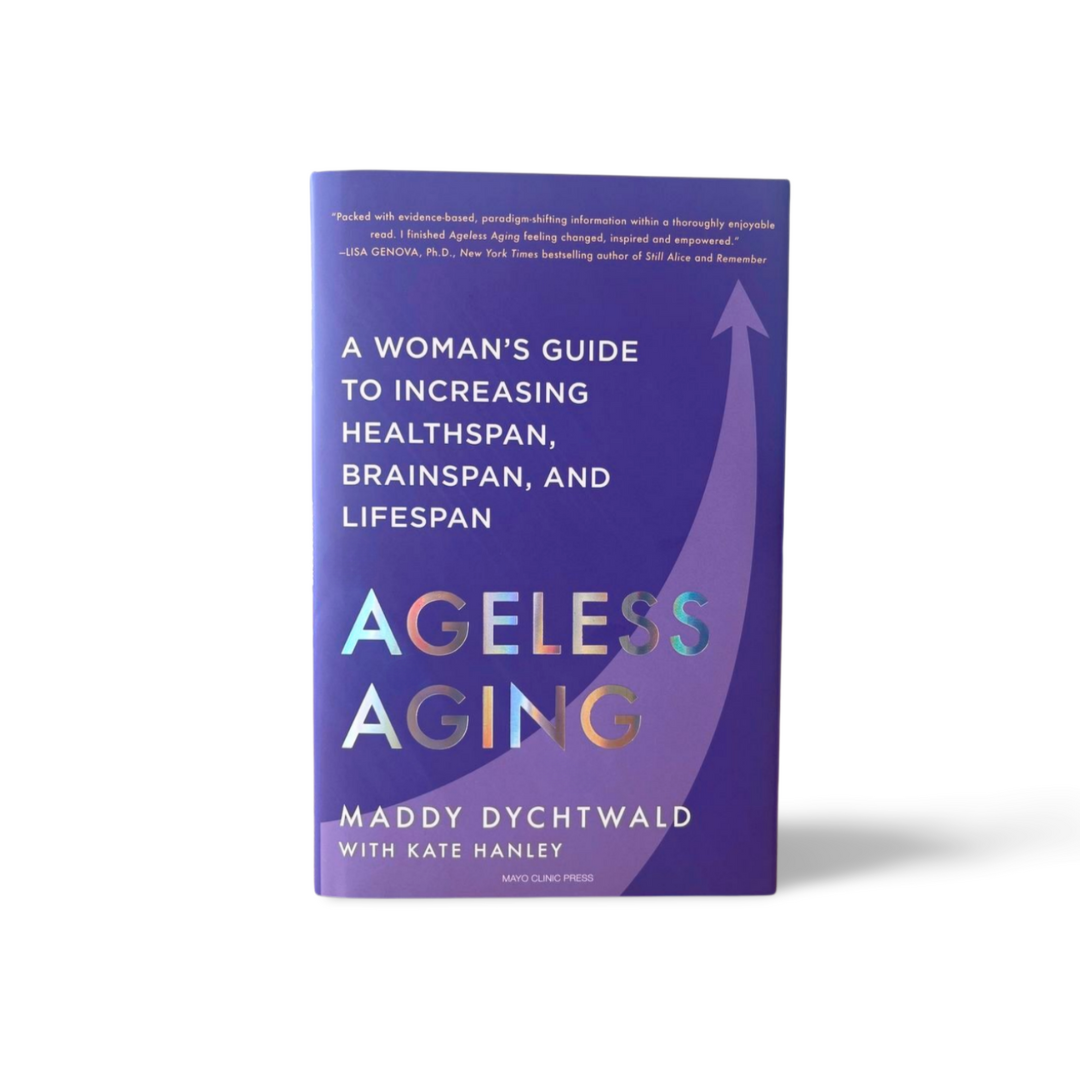
Relevant reading
Ageless Aging
Women typically spend the last 14 years of their lives in a cascade of health issues. And while current research suggests that some 70 to 90% of your health and longevity is under your control—rather than at the mercy of your genes—the reality is that most women are not taking…

